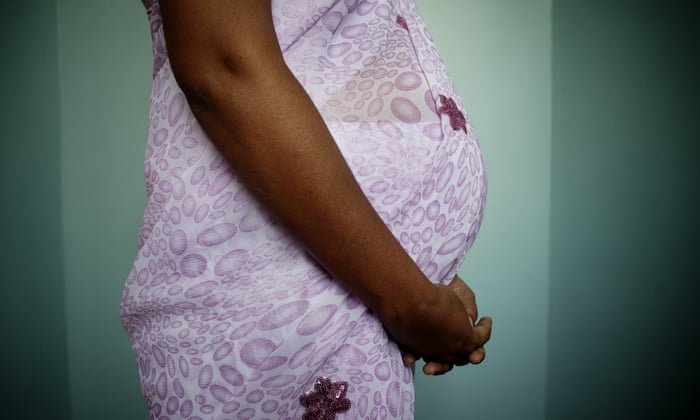Police say a Chinese manager appears to be the mastermind behind an illegal “rent a womb” operation at two Phnom Penh apartments
Erin Handley and agencies
Sat 23 Jun 2018 08.16 BST
The Guardian

Police seized passports of the five alleged ringleaders who are due in court on Sunday to be charged under Cambodia’s anti-trafficking laws. Photograph: Jonas Gratzer/Getty Images
Thirty-three pregnant Cambodian women who were carrying babies on behalf of Chinese clients have been discovered during a raid on an illegal commercial surrogacy operation, police said on Saturday.
Police arrested the group of pregnant surrogates and five alleged ringleaders in the Phnom Penh raid two days ago in the latest police crackdown on illegal child surrogacy.
Phnom Penh anti-trafficking police chief Keo Thea said one of the five, a Chinese national, appeared to be the mastermind behind the “rent a womb” operation run out of a villa in the capital’s Russey Keo district.
He said police seized passports and other documents and the five would be sent to court on Sunday to be charged under Cambodia’s anti-trafficking laws.
“They are carrying babies for Chinese nationals,” he said, adding that each woman was promised $10,000 for the service.
The case is the second of its kind in Cambodia and the first series of arrests since Australian nurse Tammy Davis-Charles was sentenced to 18 months behind bars, along with two Cambodian colleagues.
One anti-trafficking official, who asked not to be named , confirmed local reports that the Chinese national was named Liu Quang.
The 33 women were housed at the villa and were at various stages of pregnancy, he said. They had been connected to the business through brokers and were sourced from villages in Kandal, Prey Veng and Kampot provinces.
Practitioners of commercial surrogacy flooded into Cambodia after it was banned in places like India, Nepal and Thailand, in the wake of the infamous Baby Gammy case.
Individuals and couples desperate for a child of their own often face prohibitive costs or laws in their own countries, prompting them to turn to cheaper options in Asia, where the price for a child costs roughly $50,000. Between US$8,000 and US$10,000 of that is paid to Cambodian surrogates.
Surrogacy flourished in Cambodia until a snap edict from the Health Ministry outlawed the practice in October 2016. Davis-Charles and her associates were jailed the following month.
While some foreign fertility agencies pulled out of Cambodia, commercial surrogacy continued to thrive in the shadows, often with pregnant surrogates flown to Thailand for the birth of the child to circumvent Cambodian courts.
Rodrigo Montero, gender adviser at the United Nations Development Programme, said the new case showed authorities were enforcing the law.
“The bad news is that it proves that a hidden international surrogacy industry is still operating in Cambodia,” he said.
After their initial arrest the 33 surrogates were sent to the Ministry of Social Affairs, which will coordinate with NGOs to support the women, said Mom Chandany from Phnom Penh’s Social Affairs Department.
Chou Bun Eng, permanent vice chair of the National Committee for Counter Trafficking, said in the absence of a law on surrogacy, perpetrators could be prosecuted under anti-trafficking laws, although advocates of commercial surrogacy have dismissed the false comparison.
“We try to protect the baby in the womb,” Bun Eng said.
The anti-trafficking law says a person can be sentenced to between two and 20 years in prison if a child is sold for the purposes of adoption.
Cambodia’s surrogacy law has faced repeated delays, but officials say an altruistic alternative is being considered in the legislation.

No comments:
Post a Comment